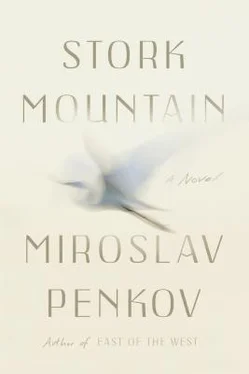Miroslav Penkov - Stork Mountain
Здесь есть возможность читать онлайн «Miroslav Penkov - Stork Mountain» весь текст электронной книги совершенно бесплатно (целиком полную версию без сокращений). В некоторых случаях можно слушать аудио, скачать через торрент в формате fb2 и присутствует краткое содержание. Год выпуска: 2016, Издательство: Farrar, Straus and Giroux, Жанр: Современная проза, на английском языке. Описание произведения, (предисловие) а так же отзывы посетителей доступны на портале библиотеки ЛибКат.
- Название:Stork Mountain
- Автор:
- Издательство:Farrar, Straus and Giroux
- Жанр:
- Год:2016
- ISBN:нет данных
- Рейтинг книги:4 / 5. Голосов: 1
-
Избранное:Добавить в избранное
- Отзывы:
-
Ваша оценка:
- 80
- 1
- 2
- 3
- 4
- 5
Stork Mountain: краткое содержание, описание и аннотация
Предлагаем к чтению аннотацию, описание, краткое содержание или предисловие (зависит от того, что написал сам автор книги «Stork Mountain»). Если вы не нашли необходимую информацию о книге — напишите в комментариях, мы постараемся отыскать её.
Stork Mountain — читать онлайн бесплатно полную книгу (весь текст) целиком
Ниже представлен текст книги, разбитый по страницам. Система сохранения места последней прочитанной страницы, позволяет с удобством читать онлайн бесплатно книгу «Stork Mountain», без необходимости каждый раз заново искать на чём Вы остановились. Поставьте закладку, и сможете в любой момент перейти на страницу, на которой закончили чтение.
Интервал:
Закладка:
And so he did. On his glass eye, he ordered the glazier to paint the sign of the Nazar, so it might ward off all evil.
It is an eerie feeling, people say, to stand before the aga, to face him. His left eye watches you, black, human. His right eye judges you, azure, never closing, divine.
* * *
“I have seen the Black Stone in Mecca, golden with sunrise,” Salih Baba says, and takes a pull from his chibouk, “the tomb of Otman Baba, Demir Baba Tekke. And now I’ve seen you, Nazar Aga, the janissary who blinded himself to please the sultan. Who betrayed his own brothers and put them to the flame. And so, I’ve seen it all, I think. I bid you welcome.”
They sit out in the courtyard of the konak , under the branches of a mulberry tree laden with fruit. The rain has stopped, but drops collected in the leaves still drum against the silken cloth on which the men are resting, and mulberries fall every now and then and stain the silk like blood. A band of servants lines the walls, yet no one dares to move before the master’s clap has echoed.
Salih Baba smokes; his chibouk crackles. The air smells of the summer storm just gone, and sweet, of tobacco. Nazar Aga watches, unmoving, quiet. The drops drum against the silk. Tenderly, softly. The mulberries fall.
“I planted this tree myself,” Salih Baba says at last. “Thirty years ago, when my feet first touched the Strandjan mud. I brought the seed with me from Anatolia. It’s best to plant a mulberry from seed. It climbs very fast at first. Then it rests. Grows deep in root and plentiful in fruit. I had it grafted. Its mulberries are now both white and black. Pleasant shade, sweet taste. This tree has always been so good to me. I hope it always shows me kindness.”
Nazar Aga raises his hand. He knows what the baba is trying to say and doesn’t want to hear it. Hadji Bektash Veli, the saint and father of the order, once planted from a flaming branch a mulberry whose tip, the legend claims, still burns even today. By the black fruit the baba means the dervishes, by the white the janissaries, both tied together in a sacred bond. Nazar Aga himself was never grown from seed — he was born an infidel, to infidel parents before the janissaries took him. Yet the baba knows how fast Nazar grew, thirsty for knowledge. And now he’s begging me for mercy. A coward, he speaks in tales.
Nazar Aga pulls out a white kerchief from his jacket and dabs against his glass eye. The socket oozes sometimes, when blood is pumping through his temples much too wildly.
“I haven’t come to talk of trees,” he says, and puts the kerchief, stained, back in his jacket. “I’ve come to end all this — infidels exempt from taxes, a governor who hasn’t built a single mosque. A church inside an Ottoman konak .”
Like a gunshot, Salih Baba’s clap rings out within the stone walls. At once a servant girl appears. She carries a silver tray, and buzzing on the tray — two cups of coffee, a leather pouch. Her feet are bare and shiny with grains of sand she picks up as she nears. Her hair, pitch-black and never cut, down to her heels, all but brushes the ground.
Nazar Aga watches her. It seems as though he’s met this girl before. Or no, as though he’s always known he’ll meet her.
Just then the girl looks up and sees him. Such fright. The tresses trip her. The tray bangs loudly on the cobblestones, the cups are shattered, and gold coins roll ringing from the pouch.
“Do what you must, Aga,” Salih Baba tells him later, when it’s clear no amount of talk or bribery can be of use. “Just wait another day. Tomorrow the Christians hold a feast. Let me watch them one last time. Then take my head.”
* * *
All night Nazar Aga tosses. All night he turns. The mountain talks to him with wind, with calling storks. He sees the girl, her bare feet, the long black hair on which she trips. She falls and he, Nazar Aga, he too is falling.
Somewhere across the hills a bird begins to sing. Another answers. It’s much too soon for dawn. And suddenly the heat of fire stings him. The torch he held to burn the janissary barracks, some twenty years back. He sees himself inside this flame: a little boy. The whole village has gathered on the square. And in the coals, his father, dancing.
* * *
And now so many years later the infidels are dancing under the mulberry tree. They carry their icons across the coals, barefooted, and the coals don’t burn them. From upon the terrace Nazar Aga watches and blood trickles down his face. There before him, the girl with the river for hair is whirling. There Salih Baba, the Bektashi, is kissing the eyes of Christian saints and taking them across the fire.
The drums are beating, the bagpipes shrieking. Like the surf of giant waves the blood booms through the aga. As if in a dream, he descends the staircase of the konak , parts the crowd of peasants in the courtyard, stands before the dancing girl. He feels the touch of wood, a holy icon, against his hand and then against his lips.
His mother is calling him from a great distance, singing that old name. His name. The saint’s.
And after this — the fire.
* * *
It is said that the morning after he joined the infidels in dance, Nazar Aga himself cut down the mulberry tree. The trunk he fashioned into a stake. The stump, into a chopping log. He impaled Salih Baba. He beheaded the nestinari . Then he set the village on fire and watched it burn for two whole days. On the third day — or so it is said — disgraced and ruined, he laid his own head down on the stump.
* * *
This was a story Lenio once told my grandfather, of how the Hasekiya was broken up, of how the surviving nestinari were forced to roam the Strandja searching for a home. Nazar Aga’s fire had turned all their icons to ash, except for two — one of Saint Constantine, one of his mother, Saint Elena. And so it was these saints the nestinari chose to follow.
This Lenio sang as many songs, strumming the mandolin out on the terrace.
It’s where I’m sitting now so many years later. Perhaps the time has come for me to sing her story. Or rather, to bring it to an end.
TWO
A WAVE OF QUIET OUTRAGE swept Klisura once people learned the news — the teacher had snuck across the border and stolen Captain Vangelis’s daughter. Within a month, there was the wedding — not in the church, but in the school yard, by the well, under the trellis white with snow. That’s where Father Dionysus held the service. Few villagers attended. The mayor too refused to go. “Don’t ask me, my boy,” he told Grandpa. “I can’t.” Nor could he legalize the marriage. After all, Lenio had crossed into Bulgaria in secret.
Then Lenio began to show. And for Klisurans all was clear. That’s why the teacher had stolen her. That’s why he’d married her outside the church. And they were right — except, the baby wasn’t Grandpa’s. The rest was true. He’d saved Lenio from the Greeks and when, one night in Klisura, she had cried inconsolably — that she was disgraced, that her life was over, that she would die alone — he’d taken pity and said, “Don’t cry. I’ll take you as my wife.”
After this, Lenio stayed with Grandpa in the school. He slept in his room, she in the room that later would be mine. He taught her Bulgarian; she taught him Greek. In the evenings, she played the mandolin, sang him songs, and showed him how to whistle like a bird. So what if he was much older, if she was pregnant with someone else’s child? Weren’t they married before God, living under the same roof?
One February night — it was a vicious winter — Grandpa awoke with Lenio’s face on his chest. “Don’t cry,” he said, a tired, old refrain, and kissed her. He was afraid she’d run away, but instead, she kissed him back. And after this, they slept together in the bed and often he told her stories of where he’d take her once spring arrived.
Читать дальшеИнтервал:
Закладка:
Похожие книги на «Stork Mountain»
Представляем Вашему вниманию похожие книги на «Stork Mountain» списком для выбора. Мы отобрали схожую по названию и смыслу литературу в надежде предоставить читателям больше вариантов отыскать новые, интересные, ещё непрочитанные произведения.
Обсуждение, отзывы о книге «Stork Mountain» и просто собственные мнения читателей. Оставьте ваши комментарии, напишите, что Вы думаете о произведении, его смысле или главных героях. Укажите что конкретно понравилось, а что нет, и почему Вы так считаете.











